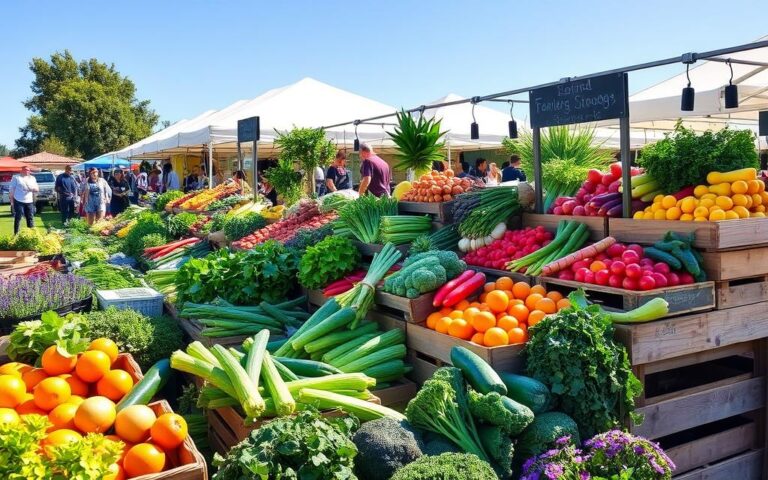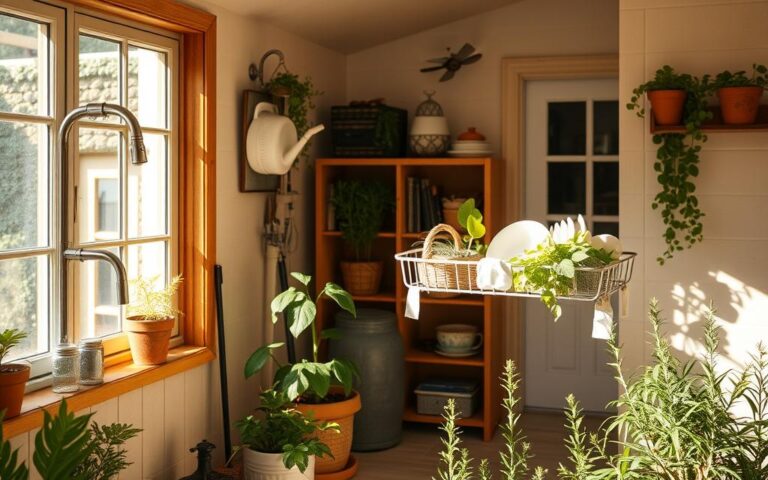Starting a zero-waste lifestyle goes beyond following a trend; it’s about committing to earth’s health. The goal is to lower what we send to landfills by changing how we use things. The Zero Waste International Alliance says it’s about reusing stuff a lot.
People like Bea Johnson, who wrote “Zero Waste Home,” show us it’s doable. Small steps can cut down a lot of waste. By going green in daily habits, you join the movement for a cleaner planet.

Understanding the Zero-Waste Lifestyle
Living a zero-waste lifestyle means you’re all in for reducing waste and using resources wisely. It’s built on five main ideas: Refuse, Reduce, Reuse, Recycle, and Rot. These steps help people rethink how they use things and make better, greener choices.
Seeing how waste moves through our world is key to handling it better. By looking at where waste comes from, we can find smart ways to cut it down. This helps us find ways to live more earth-friendly and rethink our need for single-use items.
Switching to a green lifestyle can seem tough at first. Learning to say no to things we don’t need, using less, and recycling right are big steps. Local groups and environmental offices can show us how to make these green moves.
| Principle | Description |
|---|---|
| Refuse | Decline single-use plastics and unnecessary items. |
| Reduce | Minimize overall consumption to lower waste generation. |
| Reuse | Utilize items multiple times before recycling or discarding. |
| Recycle | Properly sort and process recyclable materials. |
| Rot | Compost organic waste to enrich the soil. |
The Importance of Sustainable Living
Sustainable living is key to fighting climate change and lessening our environmental impact. By choosing eco-friendly habits, we can greatly reduce our carbon footprint. This aids in creating a healthier planet for everyone. The World Wildlife Fund (WWF) notes that such practices can cut down greenhouse gas emissions. These emissions are a major cause of climate change. This change starts with each person, as our daily choices influence larger societal trends.
In the US, the amount of household waste is very high. The Environmental Protection Agency (EPA) reports that Americans produced about 292.4 million tons of trash in 2018. This number keeps growing. It’s clear that everyone has a role in this issue, underscoring the need to shift towards sustainable living.
Being aware and taking action are crucial. When people start living sustainably, they better their lives and motivate others. This way of living matches the United Nations Sustainable Development Goals. These goals encourage habits that are good for both society and the environment.
| Year | Waste Generated (Million Tons) | Population (Million) | Waste per Person (Tons) |
|---|---|---|---|
| 2018 | 292.4 | 327.2 | 0.89 |
| 2019 | 292.4 | 328.2 | 0.89 |
| 2020 | 234.0 | 331.0 | 0.71 |
| 2021 | 234.0 | 331.4 | 0.71 |
Every small step counts in the big fight against climate change. By making thoughtful choices about what we use and buy, we can all help create a better future. This shows the strong impact that individuals can have towards achieving sustainability.
Benefits of Adopting Eco-Friendly Habits
Embracing eco-friendly habits is key for anyone wanting to improve their life and help the environment. These habits offer health benefits beyond just avoiding daily chemicals. People feel more energized and healthier when they cut down on toxic substances.
Another big plus is saving money. By choosing to use less single-use items, people spend less and find cheaper options. For example, reusable bags or containers decrease the need to buy disposable items, saving a lot of money eventually.
Communities also benefit when people reduce waste. Supporting local recycling and sustainability projects brings community members together. If more people live eco-friendly, it makes a healthier environment for everyone.
Steps to Reduce Waste in Your Daily Life
Starting to live a zero-waste life means making easy changes every day. Taking these steps not just cuts down waste but encourages us to think more about what we use. Here are some practical tips to change up your day-to-day:
- Meal Planning: Planning your meals ahead helps cut down on food waste. Creating a menu for the week means you buy only what you need.
- Bulk Shopping: Buying in bulk helps reduce the amount of packaging thrown away. Use your own containers and bags to stock up on grains, nuts, and spices.
- Mindful Purchasing: Think twice before buying something. Is it really needed? This helps cut down on buying things on a whim.
Changing your daily habits can make a big difference. The EPA says that just by reducing food waste, we can save a lot of resources and lower the emissions that warm our planet. Every small step counts towards a big goal of living more sustainably.
| Action | Impact |
|---|---|
| Meal Planning | Can reduce food waste by up to 30%. |
| Bulk Shopping | Eliminates an average of 50 pieces of packaging per shopping trip. |
| Mindful Purchasing | Reduces impulse buys by around 20%, saving money and resources. |
These methods offer a clear plan for anyone who wants to cut back on waste. They also help make our environment more sustainable for the future.
Exploring Plastic-Free Alternatives
People are choosing to live without waste, and finding plastic-free options is key. Many brands now focus on creating sustainable products. For example, Bee’s Wrap is a popular choice for keeping food fresh without using plastic wrap. These kinds of inventions help cut down on plastic trash.
Bamboo utensils are another excellent choice. They are a good-looking and practical way to eat meals without plastic. Using eco-friendly materials like these benefits both our health and the planet.
The advantages of biodegradable materials over single-use plastics are clear. Below is a table that lists some top plastic-free alternatives and why they are good:
| Product Type | Plastic-Free Alternative | Eco-Friendly Benefits |
|---|---|---|
| Food Storage | Bee’s Wrap | Reusability, compostable materials |
| Dining Utensils | Bamboo Utensils | Biodegradable, stylish |
| Drinking Straws | Stainless Steel Straws | Durable, reduces plastic pollution |
| Food Containers | Glass Containers | Reusable, recyclable |
Checking out these plastic-free alternatives shows the value of sustainable products in our daily lives. Making even small changes can have big effects on the environment. Let’s work towards a better world for future generations.

Starting Your Journey: Embracing Reusable Products
As you start your zero-waste lifestyle, choosing reusable products is key. Items like stainless steel straws, glass containers, and cloth bags make great alternatives to single-use products. They help cut down on waste and encourage sustainable living.
Studies show that using reusable items lowers plastic use and boosts eco-awareness. For example, a reusable water bottle can keep many plastic bottles out of landfills each year. Choosing cloth over plastic bags when shopping also reduces plastic waste.
Think about the environmental gains from using reusable items. Though they may cost more at first, you’ll save money over time. This is because you won’t need to buy single-use items again and again.
| Reusable Product | Single-Use Equivalent | Annual Waste Reduction |
|---|---|---|
| Stainless Steel Straw | Plastic Straw | 150+ Straws |
| Glass Food Container | Plastic Wrap | 100+ Wraps |
| Cloth Shopping Bag | Plastic Shopping Bag | 300+ Bags |
Embracing reusable products is a big part of moving towards a zero-waste life. By making sustainable choices, you help reduce waste and protect our planet for the next generations. Starting this eco-friendly path comes with simple but meaningful changes.
Composting: A Key Element of a Zero-Waste Lifestyle
Composting is essential for achieving a zero-waste lifestyle. It turns organic waste into something valuable for gardens and the environment. Microorganisms help break down kitchen scraps and yard waste into rich compost. This enhances soil health.
Vermicomposting suits city dwellers by using worms to decompose organic waste. Rural areas might prefer compost heaps for their larger waste volumes. These methods help everyone cut down on waste.
Composting reduces organic waste in landfills and cuts down on methane emissions. Methane, a strong greenhouse gas, is released when organic matter breaks down without air. Composting uses air for decomposition, which means fewer emissions and a healthier Earth.
Here’s a brief overview contrasting traditional landfill disposal with composting:
| Aspect | Landfill Disposal | Composting |
|---|---|---|
| Organic Waste Breakdown | Anaerobic conditions produce methane | Aerobic conditions enhance nutrient cycling |
| Environmental Impact | Contributes significantly to greenhouse gas emissions | Reduces emissions, enriches soil quality |
| End Result | Waste accumulation with no beneficial use | High-quality compost that nourishes plants |
Composting lowers the amount of organic waste and encourages sustainable living. Incorporating it into daily life helps the planet. It supports our gardens and the broader environment.
Recycling: What You Need to Know
Recycling is key to living without waste and helps in managing waste well. It’s important to know that you can’t recycle everything. Some items can cause issues in recycling efforts. For instance, not all items in the recycle bin are processed correctly if not sorted right.
Learning about recycling best practices makes a big difference in your area. Get to know what your local rules are for recycling. Things like glass, plastics, and paper are often recyclable. Yet, mixing the wrong items can spoil the whole batch, sending it to landfills instead.
Local recycling programs play a huge role in success. When everyone takes part, these programs work better. Knowing how to recycle helps in reaching waste management goals.
| Material | Common Misconception | Recycling Best Practice |
|---|---|---|
| Plastic Bottles | All plastics can be recycled | Check local guidelines and rinse before recycling |
| Glass Containers | Broken glass can be recycled | Only intact glass is accepted; dispose of broken glass safely |
| Paper Products | Any paper can be recycled | Avoid glossy or contaminated paper products |
Making recycling a habit benefits the environment and inspires others. By sharing knowledge, our communities can have better waste management. This helps all of us.
Zero-Waste Lifestyle: Tips for Conscious Consumption
Switching to a zero-waste lifestyle means thinking carefully about what you buy. It’s all about choosing wisely to cut down on garbage. Here are handy tricks to guide you:
- Evaluate Product Packaging: Go for items with little to no packaging or those that can be recycled. This choice greatly lessens the trash you produce.
- Choose Sustainable Brands: Pick brands that care about the planet. Look for those with green certifications or eco-friendly practices.
- Buy in Bulk: Buying more at once can reduce packaging waste and save you trips to the store. It’s a smart move for the planet.
- Practice Mindful Shopping: Make a shopping list to keep impulse buys in check. This tactic helps you stick to what you truly need.
- Repurpose and Upcycle: Be creative with what you have. Turn old clothes or jars into something new instead of tossing them out.
Studies show that small buying changes can make a big difference for the environment. Research in the Journal of Business Research indicates that mindful consumers tend to shop more sustainably over time.
| Tip | Description | Benefit |
|---|---|---|
| Evaluate Product Packaging | Opt for less or recyclable packaging. | Cuts down waste. |
| Choose Sustainable Brands | Back eco-conscious companies. | Drives positive change in the industry. |
| Buy in Bulk | Lessens packaging trash. | Reduces how often you shop. |
| Practice Mindful Shopping | Think and plan before buying. | Keeps spending in check. |
| Repurpose and Upcycle | Give old items a new purpose. | Extends the life of things. |
Conclusion
Choosing a zero-waste life is more than just a trend. It’s a journey that helps us grow and helps the planet. Every small step, like using reusable items or composting, makes a big difference. These small actions create a ripple effect, inspiring others in our community.
The United Nations Environment Programme says our personal efforts are crucial for a sustainable future. But we don’t have to do it alone. Joining local groups focused on eco-living boosts our efforts. It also teaches us more effective ways to protect the environment. When whole communities act together, the positive impact is much bigger.
Living without waste gives us hope for a cleaner earth. Our decisions today affect what we leave behind for the next generations. By acting now to reduce waste, we become Earth’s protectors. We can create a better world for us and those who follow.
FAQ
What does a zero-waste lifestyle entail?
A zero-waste lifestyle means doing things that don’t add to landfills. It’s about choosing to refuse, reduce, reuse, recycle, and compost. This helps cut down waste and supports green living.
How can I start living a zero-waste lifestyle?
Start small to live zero-waste. Say no to single-use plastics and buy less. Choose items you can reuse. Add composting and thoughtful buying to your life to make a difference.
Are there any health benefits to adopting eco-friendly habits?
Yes, living green can make you healthier. It lessens your contact with harmful chemicals. Choosing organic foods and natural cleaners, and avoiding plastics boost your health.
What are some plastic-free alternatives I can use?
Try plastic-free products like Bee’s Wrap, glass jars, metal straws, and bamboo cutlery. These choices are good for the planet and help cut down plastic trash.
How can I effectively recycle in my community?
Learn your area’s recycling rules and sort your recyclables right. Join local recycling efforts. Teaching others to recycle well helps our community be greener.
What is composting and why is it important?
Composting turns organic waste into rich soil. It’s key for less trash in landfills, better soil, and fewer harmful gases. This supports a greener Earth.
What actions can I take for conscious consumption?
To consume mindfully, look at packaging and choose eco-friendly brands. Support local and green companies. Smart choices lower waste and help our planet.
How does a zero-waste lifestyle impact climate change?
A zero-waste life fights climate change by lowering waste and living sustainably. By choosing wisely, we all can help lessen climate change together.




